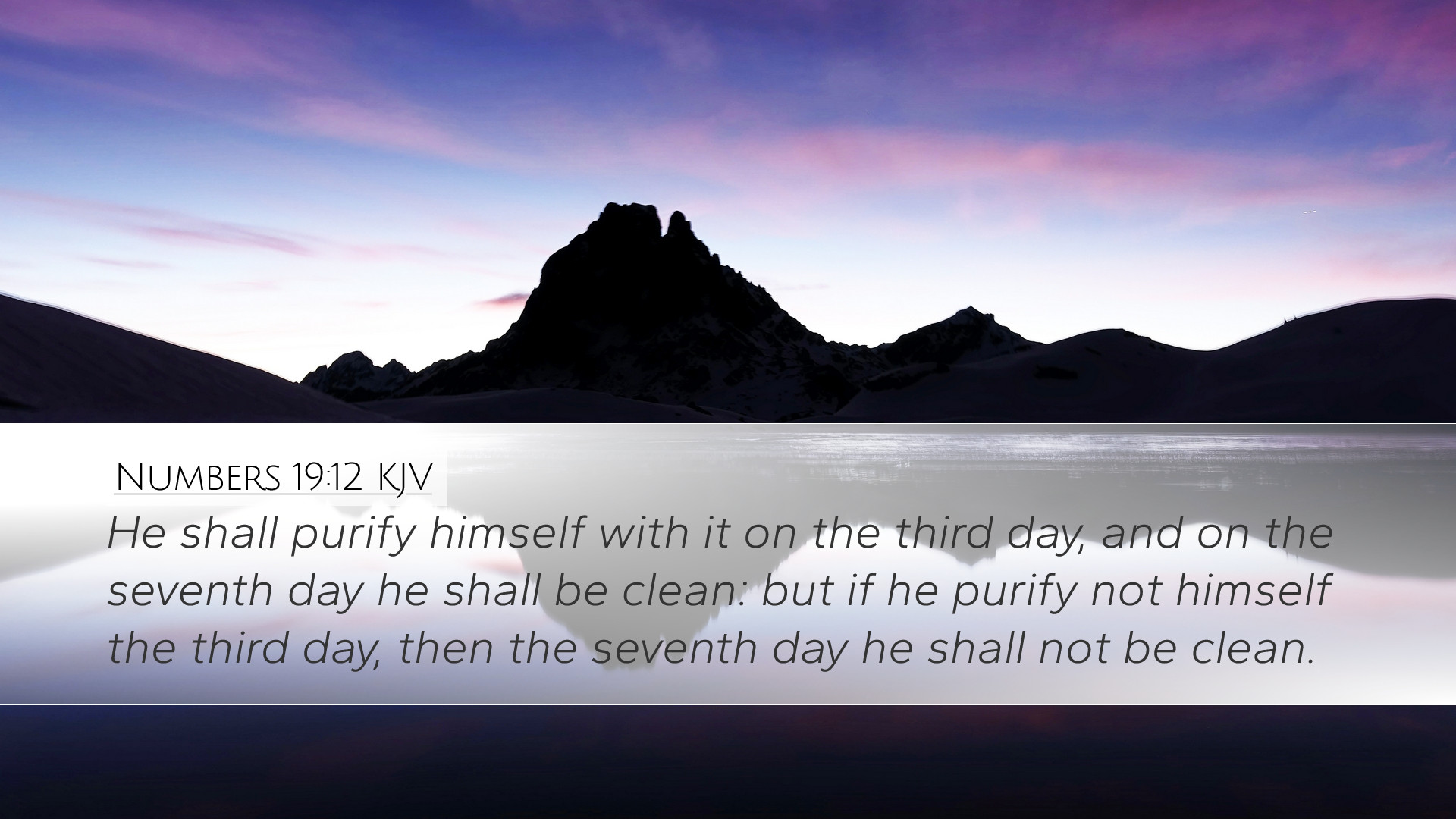Commentary on Numbers 19:12
Verse Reference: Numbers 19:12 - "He shall purify himself with it on the third day, and on the seventh day he shall be clean: but if he wash not himself the third day, then the seventh day he shall not be clean."
Introduction
Numbers 19:12 is situated within a unique section of the Pentateuch that deals with the laws of purification, specifically concerning the ashes of the red heifer. This verse underscores the importance of ceremonial cleanliness in the Israelite community, which is vital for maintaining holiness before God. The commentary on this verse draws insights from various public domain sources including Matthew Henry, Albert Barnes, and Adam Clarke, providing a comprehensive understanding applicable to pastors, students, theologians, and Bible scholars.
Contextual Background
Before delving into the specifics of verse 12, it's essential to comprehend the broader narrative within which it is located. The chapters surrounding this passage are focused on issues of purity and the means prescribed by God for maintaining it. The red heifer is a significant symbol, representing the sacrificial system and foreshadowing the ultimate sacrifice of Christ.
Significance of the Red Heifer
According to Jewish tradition, the red heifer's ashes were used in ritual purification, especially for those who had come into contact with the dead. This act of purification was not only a physical cleanse but also a spiritual one, demonstrating God’s mandate for holiness among His people. Matthew Henry points out that these purification rituals illustrate the seriousness with which God regards the law of cleanliness.
Verse Analysis
Purification Timeline
The verse specifies a detailed timeline for purification, indicating the necessity of purification on both the third and seventh days. Albert Barnes emphasizes that the requirement to purify oneself on the third day followed by the seventh day illustrates a full cycle of reestablishing purity, which signifies a complete reinstatement into the community of faith and worship.
Implications of Non-compliance
The latter part of the verse cautions that failing to wash on the third day results in a continued state of uncleanness. Adam Clarke notes that this serves as a stark reminder of the repercussions of neglecting God's commands. The specific timing underscores the discipline involved in following God’s statutes. The emphasis on the third and seventh days can also symbolize resurrection and completion, respectively.
Theological Reflections
Holiness and Community
In examining Numbers 19:12, it becomes clear that the call to purity is not merely a personal matter but one that affects the entire community. Matthew Henry articulates that individual purity contributes to the corporate holiness of God’s people. When one is not clean, they risk contamination of communal worship and fellowship, which is critical in the life of the church today.
Foreshadowing Christ
From a Christological perspective, this passage foreshadows the work of Christ, the Lamb of God, whose sacrifice offers ultimate purification for sin. The ritual of the red heifer is viewed as a precursor to the redemptive work of Jesus, who cleanses us from all unrighteousness and reinstates us to right standing before God. Albert Barnes reflects on this theological nuance by suggesting that the rituals serve as a shadow pointing towards the greater reality found in Christ’s redemptive work.
Practical Applications
Discipline in Holiness
This verse calls for a disciplined approach to holiness. For pastors and church leaders, it is critical to emphasize the importance of adhering to spiritual disciplines that foster purity and devotion to God. Regular engagement with the Word, communal worship, and accountability within the body of Christ are practices that align with the essence of being set apart.
Understanding Sin and Cleansing
Understanding the seriousness of sin and the necessity of cleansing can aid individuals in grasping the depth of God’s grace. The meticulous details of purification rituals can serve as a reminder of how far God goes to ensure His people are pure, a reflection of His love and commitment toward us. Adam Clarke argues that reflecting upon these rituals ignites a greater appreciation for the grace we have received in Christ, emphasizing that while our purification requires discipline, it is ultimately grounded in grace.
Conclusion
In summary, Numbers 19:12 serves as a profound reminder of the importance of purity both personally and communally among God's people. The specified ritual provides insightful reflections for modern believers on the nature of sin and the necessity of holiness. As we understand the historical context and theological implications, we are compelled to approach our spiritual lives with a renewed sense of commitment to God’s commands, fully aware of the grace that restores us to a place of cleanliness before Him.


